 Michelle Orange
Michelle Orange
In Kelly Reichardt’s latest feature, a beleaguered ceramicist in Portland’s art scene struggles with questions about the pleasures and purposes
of the creative life.
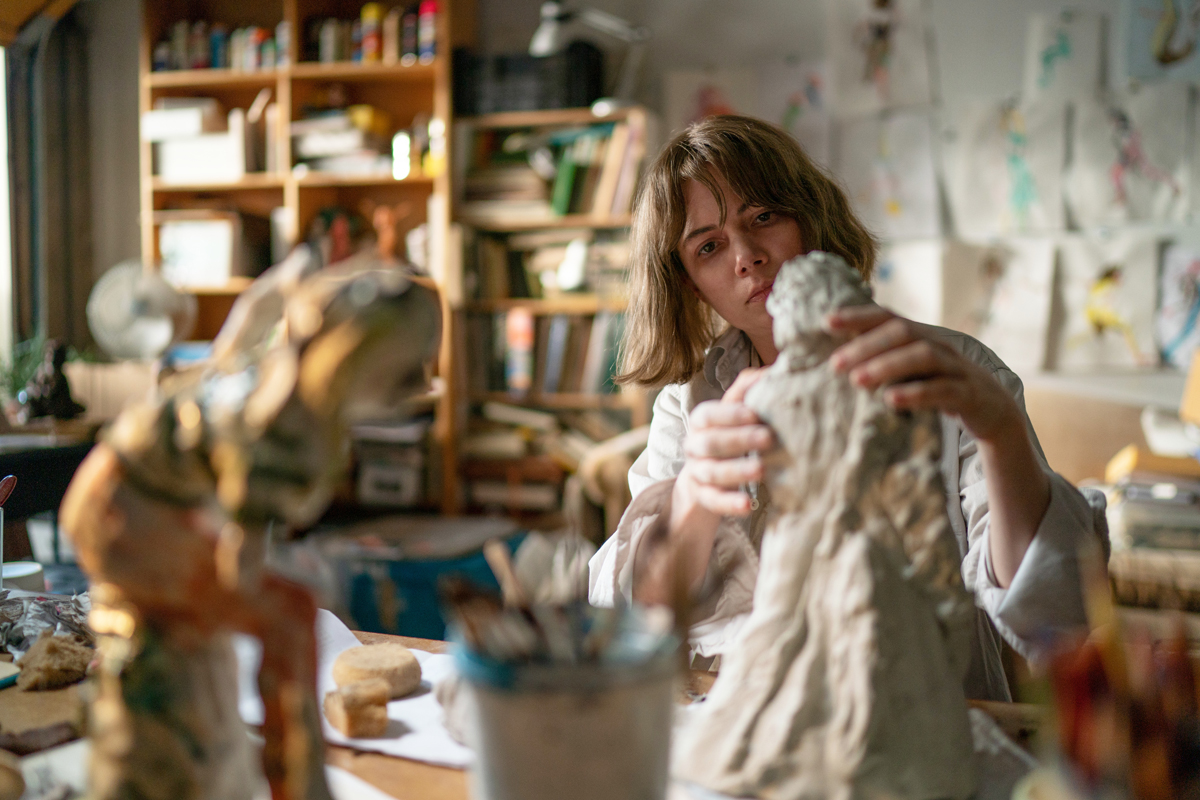
Michelle Williams as Lizzy in Showing Up. Courtesy A24. Photo: Allyson Riggs.
Showing Up, directed by Kelly Reichardt, now playing in theaters
• • •
The Portland, Oregon art school featured in Showing Up, Kelly Reichardt’s eighth feature film, may divide audiences into those who view a temple of rug-weaving, earthwork, and “thinking in movement” as either an Edenic wonderland or a crochet-laden circle of hell. Reichardt’s introduction of the campus (shot at the recently closed Oregon College of Art and Craft) offers a first litmus test in the form of a young woman showing off what appears to be her thesis project: a full-body knit jumpsuit in multicolored yarn. “A whole year of my life!” she exclaims to her mentor (André Benjamin), not quite believing it herself. Shades of Portlandia infuse the world of Showing Up, which is not just Reichardt’s funniest film—a low bar—but also game in a way that rescues its players from caricature, risking silliness to propose the serious imperatives of any dedicated pursuit, even one that may or may not involve putting a bird on something and calling it art.
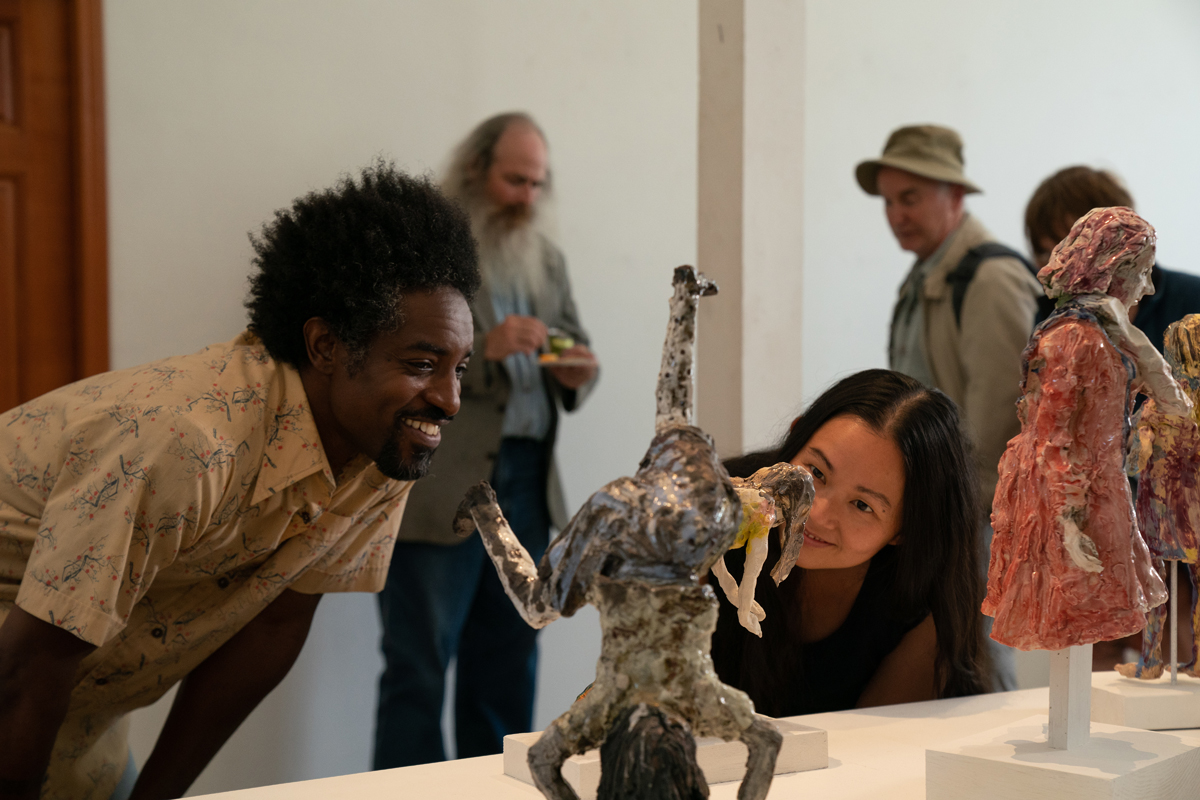
André Benjamin as Eric and Hong Chau as Jo in Showing Up. Courtesy A24. Photo: Allyson Riggs.
Foremost among the artists in the Portland micro-scene whose various systems and economies Showing Up depicts with a sly and delicate touch, Lizzy (Michelle Williams) and Jo (Hong Chau) offer a study in contrasts of temperament and status, if not talent. Both single and on their own, each is navigating the uncertainties of the post-ingenue, postgraduate phase of their creative lives. Languid and plausible with her waist-length hair and overalls, Jo makes this look easy because Jo lives at ease: confident of her place in the local firmament and savvy to its workings. In her studio apron, baggy chinos, and posture of pre-affront, Lizzy is what happens when passive aggression becomes a way of life. Where Jo is a fixture of their scene, earning and spending social currency like so much rainbow yarn, Lizzy is another of Reichardt’s lone wolves, a figure whose efforts against her own isolation only seem to compound it. Her campaign to get Jo, who is also her landlord (“She really figured it out,” Lizzy mutters of Jo’s canny move into real estate), to fix her busted hot-water heater becomes invested with an indignance whose nature and origins Reichardt teases but refuses to lay bare.
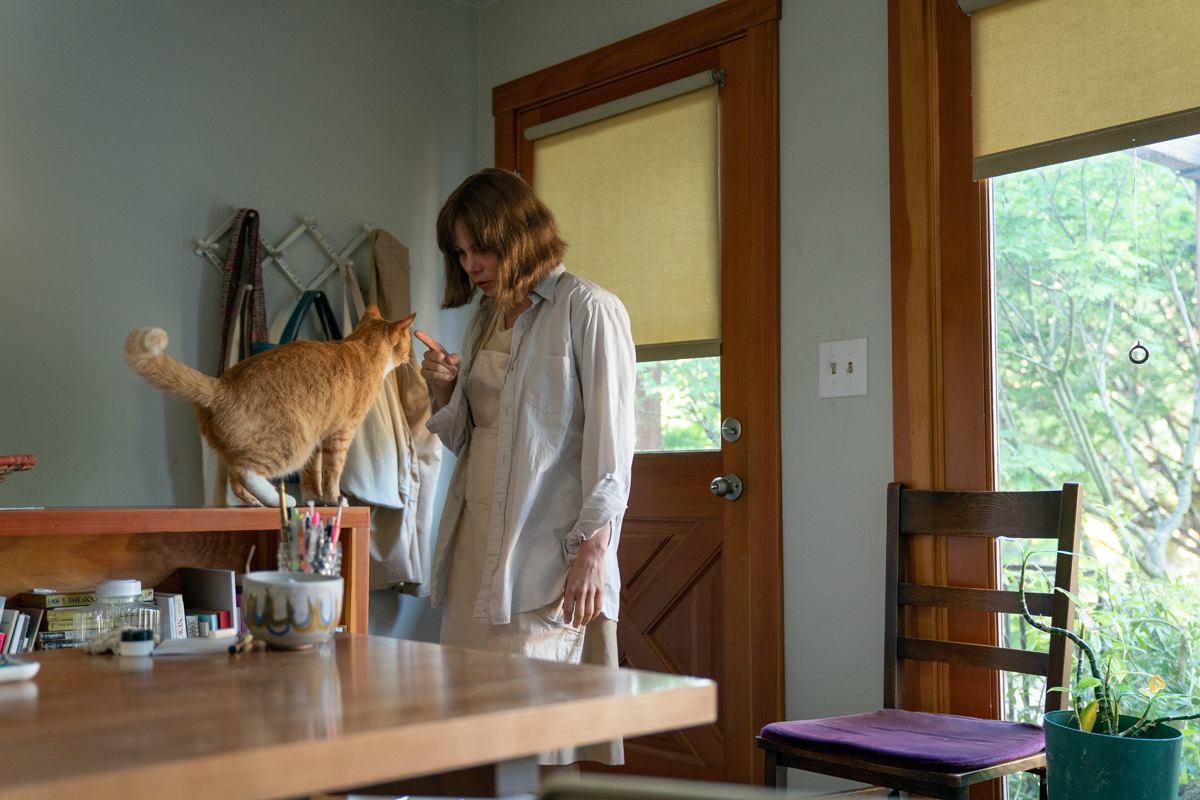
Michelle Williams as Lizzy in Showing Up. Courtesy A24. Photo: Allyson Riggs.
Pieces by Portland ceramicist Cynthia Lahti and Bronx installation artist Michelle Segre stand in for Lizzy’s figurative sculptures and Jo’s large-scale conceptual pieces, respectively, but value judgments about either character’s ability fall outside the story’s sphere of interest. Reichardt steers us past several other great-artist narrative tropes: the late appearance of Lizzy’s reclusive, disturbed brother, Sean (John Magaro), threatens a detour into “mad genius” territory; the attention shown by a visiting faculty member to Lizzy’s work raises the specter of a “career breakthrough.” Cowritten by Reichardt and her frequent collaborator Jonathan Raymond, Showing Up is instead animated by its steady pursuit of the rhythms and relationships that define the main characters and frequently overpower their ambitions, the habits of endeavor and community that give shape (or a lack of shape) to their lives.
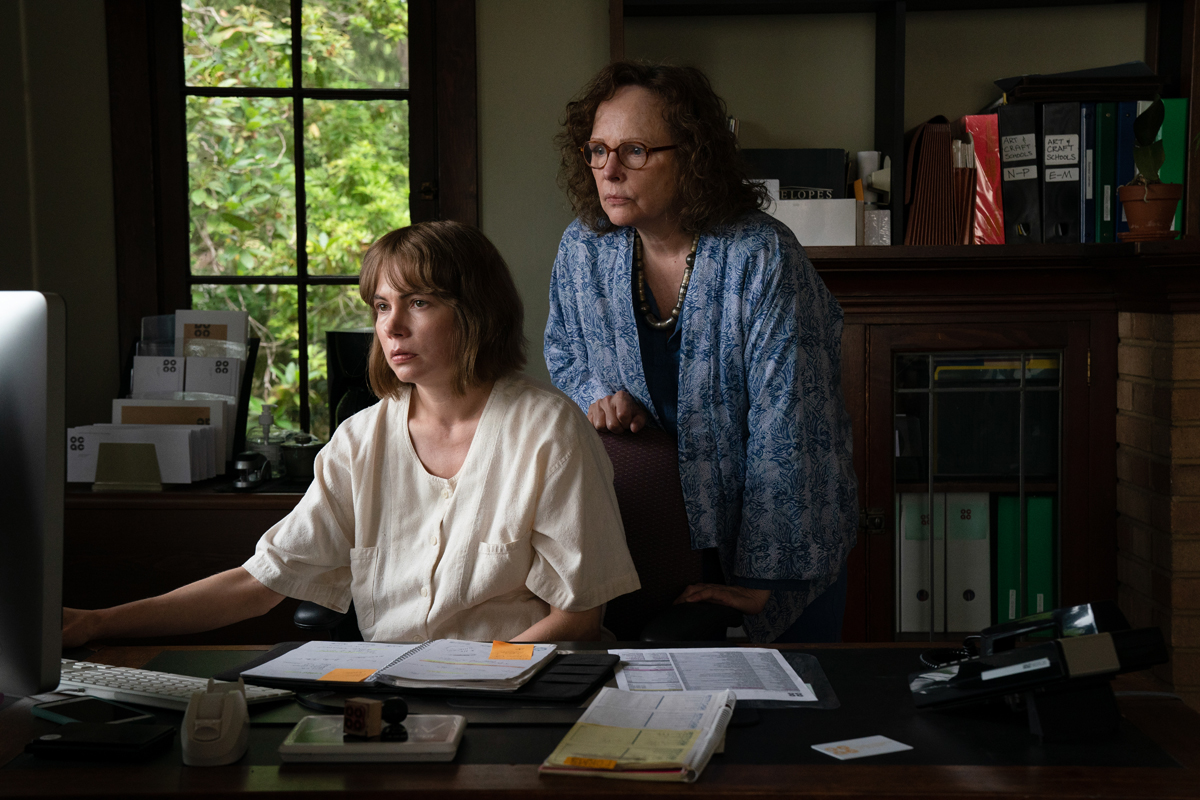
Michelle Williams as Lizzy and Maryann Plunkett as Jean in Showing Up. Courtesy A24. Photo: Allyson Riggs.
Working under her impatient mother (Maryann Plunkett) at a campus office and struggling to prep for her upcoming show (Jo, of course, is prepping two shows), Lizzy appears skeptical of her milieu and conscious of delivering exactly what is expected of her—in this case, another batch of haunted figurines, tattered women posed in various, weightless attitudes. Whether contained, unbridled, or temporarily held at bay, Lizzy’s unspoken ambivalence forms the center of every scene, framing at a slightly different angle the question at the heart of Showing Up: What makes a life in art-making worthwhile? Is there value in staying small, if not mediocre, as almost every artist will? In persisting toward another wine-and-cheese wake where your friends and family will at least pretend to admire, if not understand, what you’ve come up with this time?
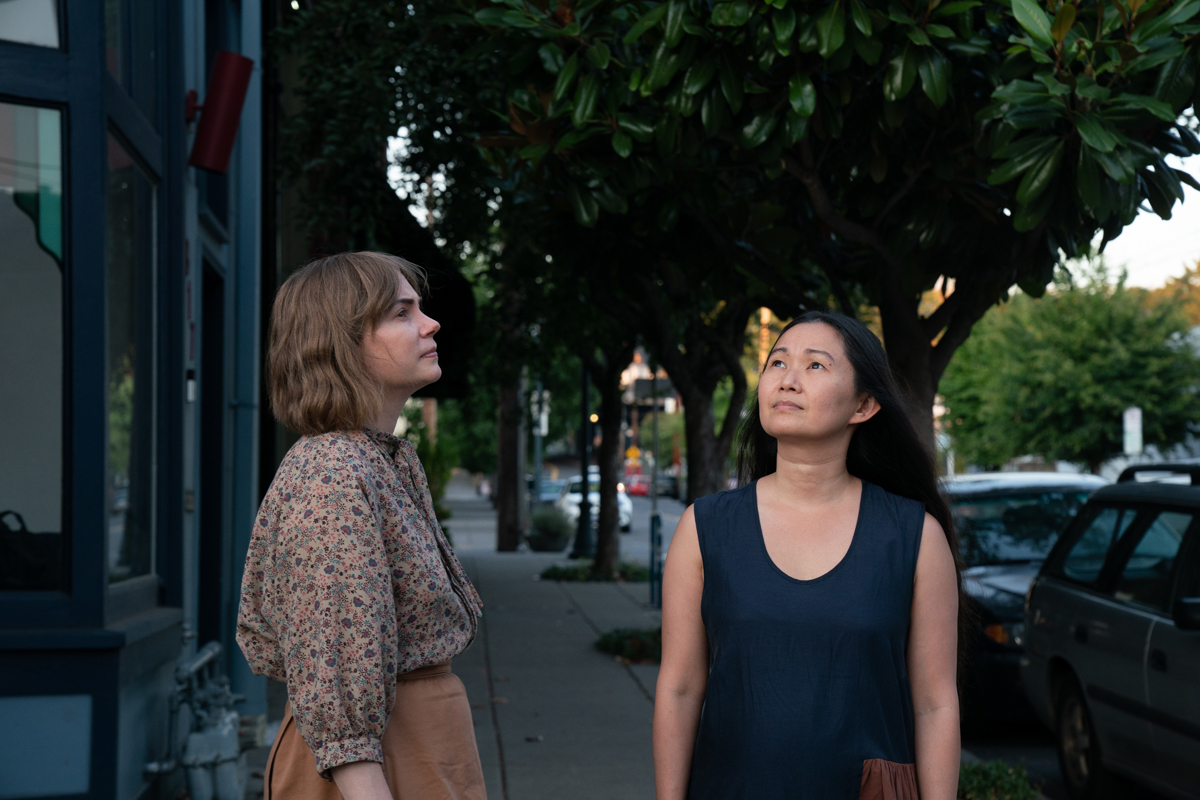
Michelle Williams as Lizzy and Hong Chau as Jo in Showing Up. Courtesy A24. Photo: Allyson Riggs.
“The only joy in these things is thinking how miserable you’d be if you weren’t doing them,” Elizabeth Hardwick told her former student Darryl Pinckney on the occasion of his first publication in the New York Review of Books. Williams brings this observation to glorious, unpretty life: whatever the merits of her artistry, Lizzy is a suitably fractious patron saint of the art of abiding in the face of life’s daily insults and demands; of the craft involved in balancing both against the relief of creation, in finding an often miserable process more vital than any other thing you might be doing in and for the world. Sunny and casual to the point of carelessness, Jo would seem to stand apart from this struggle, marked as a figure not just of annoyance but a kind of imposture. The women’s shared responsibility for an injured pigeon (I don’t really want to talk about the pigeon) takes Lizzy a few steps in Jo’s direction, the way of connection, of abiding as just one part of life. It may be that Jo’s charms—her parties, her enthusiasms, even her dating life—have something to do with the praise her work commands, and it may be there is some justice in that.
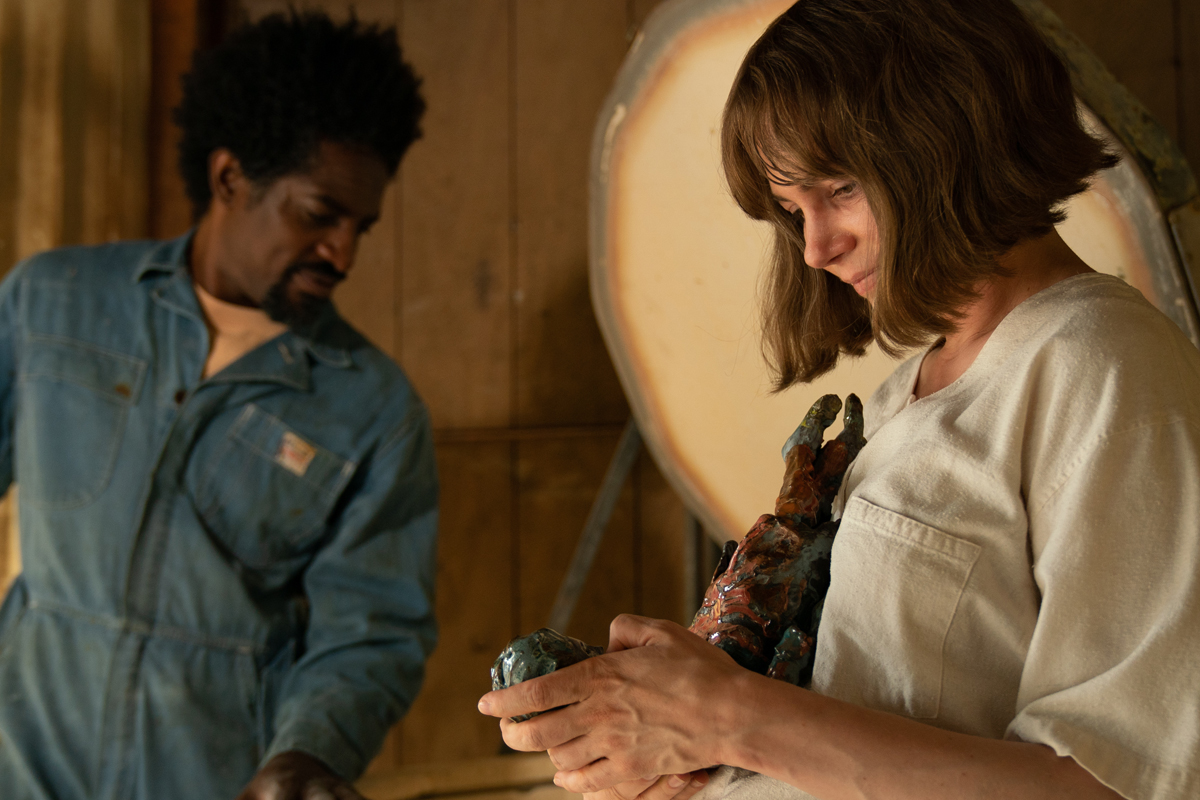
André Benjamin as Eric and Michelle Williams as Lizzy in Showing Up. Courtesy A24. Photo: Allyson Riggs.
Several times in The Fabelmans, the Steven Spielberg bildungsroman in which Williams plays Mitzi, the budding director’s eccentric mother, Sammy Fabelman recoils when those around him refer to filmmaking as his hobby. “Like stamps, or butterfly collecting,” says Sammy’s simpatico Uncle Boris (Judd Hirsch, who in Showing Up plays Lizzy’s father, another ceramicist now as fond of puttering about as he once was of making pots). As in: benign distractions of no real consequence. As in: the kind of thing that never made anyone rich and/or famous. A slow and tender burn, Showing Up insists on how little can—and perhaps should—separate the artist from the hobbyist. That even the most exalted artist is driven by forces not dissimilar to those that, for many months, have returned my dog to her work—unbeknownst, until recently, to me—digging a vast underground lair in the woods near our home: because she too requires daily purpose, focused exertion, something only she can do.
Michelle Orange is the author, most recently, of Pure Flame: A Legacy.